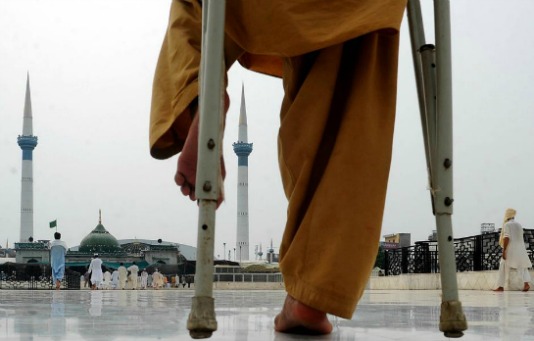
Last September saw the launch of two initiatives for Muslims with special needs. This year a special session was held at the ISNA 2014 convention with panelists Dilshad D. Ali, an autism mom from Richmond, DMV native Nashiru Abdulaib of Global Deaf Muslims, Sh Zaynab Ansari, and Sh Omar Suleiman, who has just launched MUHSEN which means "One who shows excellence and compassion" and stands for Muslims United for Handicap & Special Education Needs. The panel was moderated by Marylander Maggie Siddiqi, the program director of EnabledMuslim.org—an online network for spiritual and community support for Muslims living with disabilities and for their loved ones, a project of American Muslim Health Professionals (AMHP).
Many Muslims with disabilities report feeling isolated and unsupported in American Muslim community settings according to a survey taken by EnabledMuslims. 160 people with disabilities or their loved ones responded to the survey. “The most intriguing point of the survey was the sheer diversity of disabilities that people experience, from intellectual disabilities, arthritis, gastro diseases to depression,” shared Siddiqi in an interview with the Muslim Link.
Although there are likely over 600,000 Muslims living with disabilities in the US alone, there is currently no dedicated effort to provide them with the spiritual and community support they need, says Siddiqi. EnabledMuslim seeks to address this through its online support network and a growing resource database with Islamic scholarly perspectives on disability, tips on how to create welcoming and inclusive Muslim community settings, and more.
Ali, who is also a journalist and blogs about her family’s special needs journey on Muslimah Next Door, writes about her involvement in EnabledMuslim. “Through diligence, never-ending detective work and sheer willpower, I have cobbled together the best answers I can for my child and continue to try and forge the most respectful, dignified and inclusive path for him in school and in the community. It’s taken us 14 long, long years to get to where we are, and we are still just getting started, learning more every day of what’s out there. I don’t want it to be so hard for others. [When]hen you have a child or family member with a disability, of course you will become their strongest advocate.” She is grateful that the community is finally moving from the awareness stage to a place of action. EnabledMuslim provides them with access to relevant information about their situation and the ability to connect and sustain long-lasting relationships with others who have similar experiences. EnabledMuslim advisers include Ali, Isra Bhatty, Amin Tawakul, Asad Moten, Sukaina Dada, and Mohammed Yousuf of advocacy group Smile Canada, Debra DePalma, Sarah Kalim-Ullah, and William Gaventa.
“Of all the potential resources we could provide through EnabledMuslim.org (including job listings and Islamic perspectives), the overwhelming number of respondents were looking for a network to connect with others like themselves,” shares Siddiqi. In response to a question about resources to help Muslim communities learn more about disability issues, respondents felt the number one priority was to provide "information on how to better welcome and include Muslims living with disabilities in Muslim community activities," followed closely by "recommendations for disability-related events and services in Muslim communities (e.g., educational workshops, a fun fair for kids living with disabilities, jobs listing for adults living with disabilities)." EnabledMuslim plans to follow up by providing these resources as well.
Masajid are usually not places where one would expect people with disbilities to feel excluded, alone, or worse treated with disdain. How can we transform our mosques into spaces where Muslims with disabilities and their families feel welcomed and have ample opportunities for worship, friendship, and leadership, ask advocates concerned with disability inclusiveness?
MUHSEN found by Sh Sulieman, is run and managed by Joohi Tahir, who has a daughter with autism and “has constantly struggled, as many Muslims do, with the lack of understanding and accommodations for people with special needs in [masajid] across the country,” according to Sh Sulieman.
Accessibility is a big concern for special needs families. “Inclusivity in prayer areas that accommodate both those with disabilities and their families, this includes architectural insight that has implications for the usual makeup of our prayer areas. Plenty of benches, ramps (if there are no elevators), uncarpeted areas, good lighting, easy to reach bookshelves, wider pathways that lead into the prayer areas, handlebars on at least one of the walls if not all, and much more,” shared a woman, whose sister has cerebral palsy when asked by the MUHSEN admin on their Facebook page: “What is the single most important service in your opinion, that your Masjid can provide for Individuals/Families with Disabilities?”
Classes, trained Sunday school teachers, on site support groups were all on the wish list. “It is so important that you see the child, not just a disability. These children are no less Muslim and no less deserving,” Tahir has advocated through the years. MUHSEN will advocate, educate, train and implement programs and services nationwide to improve access to masajids for handicapped and special needs individuals as well as acceptance and inclusion by the community in all aspects of their daily lives.
One family member commented that they stopped taking their father to the masjid as segregated prayer areas made it difficult for their mother to keep an eye on their father with the disability.
The EnabledMuslim website has section for individuals with disabilities, loved ones with people with disabilities, health professionals and members of the Muslim community. Also featured are links to resources and highlights about notable Muslims with Disabilities. Siddiqi says the site is still a work in progress and help is needed ‘to make it grow into a robust resource that connects people nationwide and beyond.’ Both these initiatives have the capability and the access—to high profile advocates and policy makers— to make serious impact on the quality of life of many American Muslims with special needs, their caretakers, loved ones, and communities. [Source: EnabledMuslims]